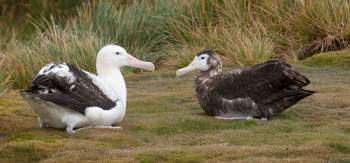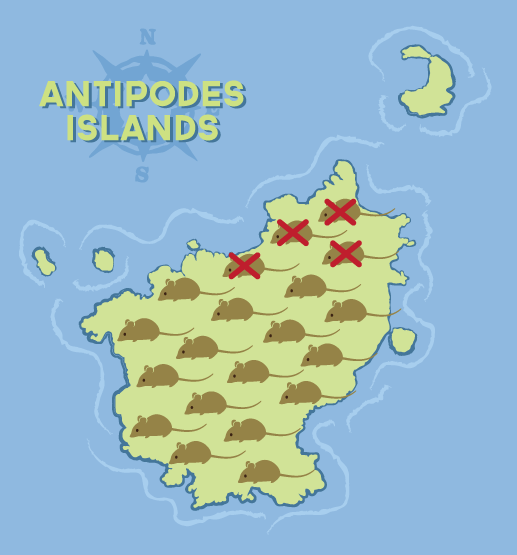Our Far South is a Morgan Foundation project aimed at raising New Zealanders' awareness of the area south of Stewart Island. Its latest activity is the Million Dollar Mouse campaign which aims to raise that sum to eradicate introduced House Mice Mus musculus from New Zealand's Antipodes Islands. The main island which is infested by mice is 2100 ha in size, smaller than the largest island (3800 ha) from which mice have so far been eradicated (click here).
The campaign has won the support of New Zealand's Minister of Conservation, Kate Williamson (click here). It is intended that the eradication will be carried out by New Zealand's Department of Conservation in winter 2013. "Two aerial bait drops will be carried out. Bait will be dropped from specially designed buckets slung under helicopters, using purpose-designed GPS systems to guide their flight lines. This ensures both that no gaps are left (which could lead to mice surviving) and minimises overlap, which would result in wasted bait."
Funds will be raised by a partnership that includes The Morgan Foundation, the Department of Conservation, World Wildlife Fund, Fiordland Conservation Trust, Heritage Expeditions and Kiwibank.
The Morgan Foundation (established by the family of Joanne and Gareth Morgan of Wellington) will match contributions from the public until the target is reached. So far, according to its web site, the sum of NZ$ 215 220 has been raised from matched donations, so the campaign is already over one-fifth of the way to its target.
"The project ... will secure the only home of the Antipodes Island snipe and the Antipodes Island parakeet. These islands are also critical breeding habitats for Antipodean albatross, white-capped mollymawk, white-chinned petrel, grey petrel, soft-plumaged petrel, and black-bellied storm petrel. As well there are at least 20 insect species and at least 3 plants that are restricted to these islands."

Antipodean Albatrosses. Photograph by Derren Fox
Although as yet there are no reports of Antipodes mice attacking ACAP-listed albatrosses and petrels directly on the Antipodes, as they do on Gough and Marion Islands, it is known that the island's indigenous invertebrates and plants have been affected.
You can read more about the "Million Dollar Mouse Campaign" at http://www.scoop.co.nz/stories/AK1203/S00734/million-dollar-mouse-pest-busting-campaign.htm.

Progress to date. Map from http://www.ourfarsouth.org/milliondollarmouse/
Once the Antipodes are mouse-free, it will be the big challenge of the pigs, cats and mice of Auckland Island to tackle before all of New Zealand's southern islands are finally free of introduced mammals. What a day that will be!
Click here to read a previous item in ACAP Latest News on how the eradication of mice on islands thoughout the Southern Ocean is progressing.
John Cooper, ACAP Information Officer, 1 April 2012

 English
English  Français
Français  Español
Español